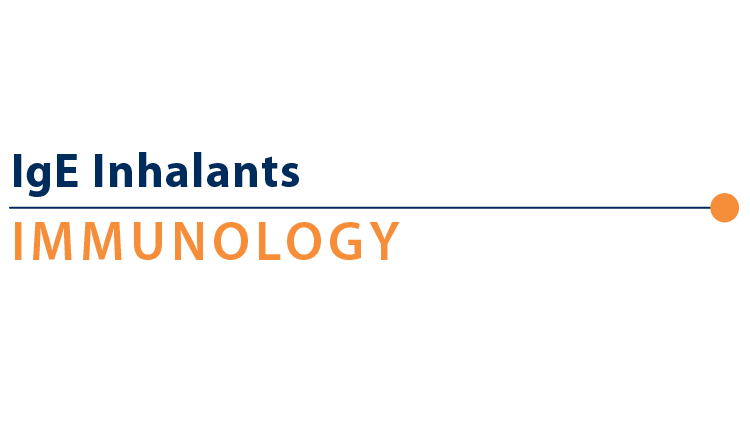Description
Identify Indoor Household Allergies and Outdoor Seasonal Allergies
The IgE Inhalants Profile is a blood test that measures IgE antibodies to 16 common indoor and outdoor inhalants specific to 18 North American geographic regions. The profile also includes a total IgE measurement. Testing can help identify whether an allergen is triggering the common symptoms associated with seasonal, pet or mite allergies. These symptoms include sneezing, coughing, itchy and watery eyes, and others. The patient can experience relief with symptom management, and by avoiding ongoing exposure to the identified allergen.
When should testing for IgE Inhalant Antibodies be considered?
Testing for IgE inhalant antibodies is useful for individuals who suspect that they are reacting to an environmental stimulus. Household inhalants include cat and dog dander, cockroach, and mites. Outdoor inhalants include trees, grasses, weeds, and molds, and may bloom or pollinate at various times depending on the region.
An IgE allergic response involves immediate-hypersensitivity to a substance. It is important to test when the patient is symptomatic. Circulating IgE antibodies have a short half-life of around 1-2 days, and will only be produced after exposure to the substance. The presence of circulating antibodies may affect each patient differently. According to the American Academy of Allergy, Asthma, and Immunology, “A key message is that a positive allergy test result (skin or blood) indicates only the presence of allergen-specific IgE (called sensitization). It does not necessarily mean clinical allergy (i.e., allergic symptoms with exposure).”1 Therefore, test results should always be viewed in the context of the overall clinical picture.
Symptoms and conditions associated with IgE inhalant allergies
- Stuffy or itchy nose, sneezing, rhinitis or sinusitis
- Itchy, teary eyes, conjunctivitis
- Cough, shortness of breath, wheezing, asthma
- Skin rash or hives
Ordering the test
The IgE Inhalants Profile can be ordered as a stand-alone test or bundled with other profiles. Often times, clinicians will bundle several smaller profiles in order to see a more complete picture of the patient’s immune-mediated response. Profiles that can be bundled include:
| Profile | Includes |
| IgG Foods | 87 foods plus total IgE |
| IgG Vegetarian | 21 foods plus total IgE |
| IgG Spices | 23 spices plus total IgE |
| IgE Foods | 19 foods plus total IgE |
| IgE Molds | 15 molds plus total IgE |
| IgE Inhalants | 16 inhalants specific to 18 North American geographic regions plus total IgE |
| Celiac and Gluten Sensitivity | Total IgA, tTG IgA, DGP IgA, EMA IgA, Anti-Gliadin IgG & IgA |
What advantage does the IgE Inhalants Profile offer compared to other diagnostics?
Identifying airborne allergens can be difficult and testing serum allergen-specific IgE antibodies is helpful. Allergen-specific serum IgE testing does not involve introducing an allergen in order to test. Instead, already circulating antibodies are measured, however, the patient must have been exposed to the allergen in the days leading up to testing in order to detect antibodies.
A skin-prick test involves the injection of an allergen on the skin then observation for a reaction. Serum testing can be especially useful when skin-prick tests cannot be performed for example, due to extensive dermatitis or dermatographism, when antihistamines cannot be discontinued, or those with a history of anaphylactic reaction.2
Genova’s Methodology
IgE Antibody Testing
Genova utilizes the FDA-cleared Siemans Immulite® 2000 Total IgE and 3gAllergy Specific IgE Universal Kits. Immulite® 2000 Total IgE is a solid-phase Chemiluminescent assay. Immulite® 3gAllergy Specific IgE is a solid phase, two-step, chemiluminescent immunoassay that exploits liquid phase kinetics in a bead format. Siemens proprietary liquid allergens are the key to making IMMULITE® 2000 Immunoassay allergy tests sensitive, specific, and reliable. The soluble polymer/copolymer support for the allergens increases the number of binding sites and their accessibility to allergen-specific IgE antibodies. Enzyme-enhanced chemiluminescent signal detection provides increased sensitivity and the proprietary wash technique enhances specificity.
What can clinicians and patients expect from IgE Inhalant testing?
In general, clinical management of the patient with inhalant allergies involves medicines, allergy shots and/or supplements to manage symptoms, as well as cleaning and preventing further exposure to the identified allergen in the household. HEPA filters and regular cleaning practices may help to reduce the allergen burden.



